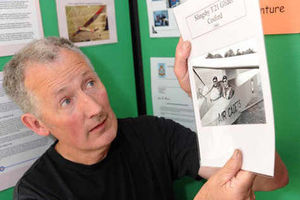Peter Rhodes' Dispatches from Devon
Blogger of the year PETER RHODES on holidays, charity-shop scams and a motorist who thinks it's fine to text and drive

ANOTHER year rolls around and here we are once again in the south Devon fishing village of Beer, just as we have been every summer for the past 40-odd years. Apart, that is, from one year when we displayed our funky, footloose dynamism by giving Beer a miss. Believe me, Devon-deprivation is a terrible thing. We had to go twice the following year to make up for it.
YOU might think all the years and all those holidays would run into each other. Not at all. The secret with holidays is to remember each one by attaching it in your mind to the unique, unrepeatable event that happened during it. So Avignon '66 is forever linked with the World Cup. Woolacombe '67 was marked by the Torrey Canyon disaster. Italy 2005 saw the death of Pope John Paul. We remember our holiday in Beer last year because that was when Charles Saatchi was photographed with a tearful woman in a London cafe. That couldn't possibly happen again, could it?
HOLIDAY reading. The War Dispatches of Sir Philip Gibbs, a one-man awkward squad on the Western Front. One Thousand Years of Annoying the French by Stephen Clarke, starts with the reassuring fact that the Battle of Hastings was not a French victory. GWR Ganger, Alec Brew's stirring but unsentimental account of his grandfather's career on the railways and at war - local history at its best.
A FRIEND looked particularly alluring in a new Boden dress which turned out to be from a corporate donation by Boden to the Scope charity shops. The washing-instruction tab is overprinted with"Returnable only to Scope." This is to stop people buying the dress for a fraction of its market value at a charity shop and then trying to return it to Boden and reclaim the full price. Hard to believe we share the planet with such scum.
THE Director of Public Prosecutions Alison Saunders wants to increase the number of convictions in rape cases. She says: "I am determined to ensure our long-term progress to tackle rape continues, particularly in dispelling the myths and stereotypes surrounding these types of cases." And yet the measures she suggests, such as monitoring police decisions not to proceed with cases, are hardly revolutionary. So here's a better idea. Let every rape case begin with full disclosure of the defendant's previous criminal record. Let juries know the truth, the whole truth and nothing but the truth about the accused, and then judge the case on the facts. The courts would see an immediate rise in the number of guilty pleas and a sharp decline in silver-tongued lawyers trying to fool juries into believing that a man who has a string of serious sexual offences and has already been jailed for three rapes is a thoroughly decent chap. In these days of CCTV coverage and DNA analysis I doubt if there would be many wrongful convictions and any unsafe ones could be sorted out at the Court of Appeal. And if total disclosure works in sex cases, why not extend it to all criminal trials? Trust the juries.
A FRIEND, travelling as the passenger in a car, couldn't help noticing that the driver in the car which undertook them approaching traffic lights was busily texting on his mobile phone. My friend mouthed the advice: "Put it away." The response, bellowed by the driver was: "Grow up, you sad old ****!") There was not an ounce of remorse or apology, just a yobbish assumption that texting while driving is fine and that anyone who objects must be living in the past. And the next thing you know, someone stops living altogether.





